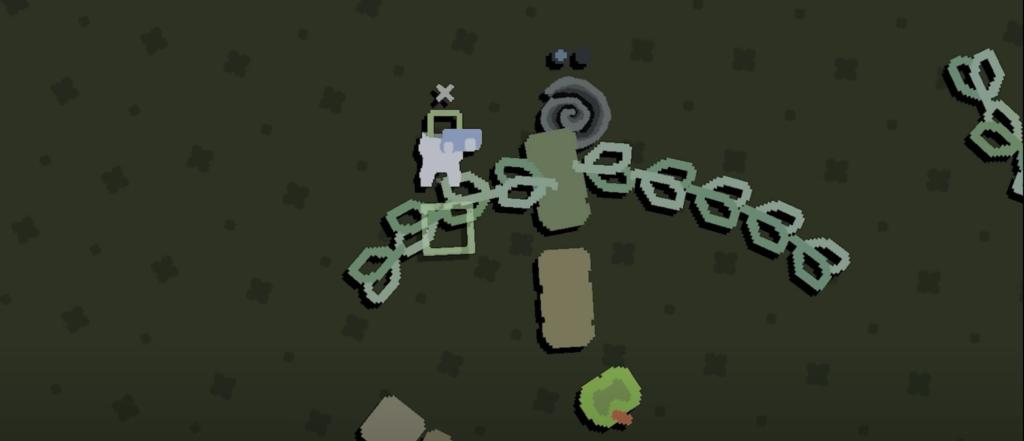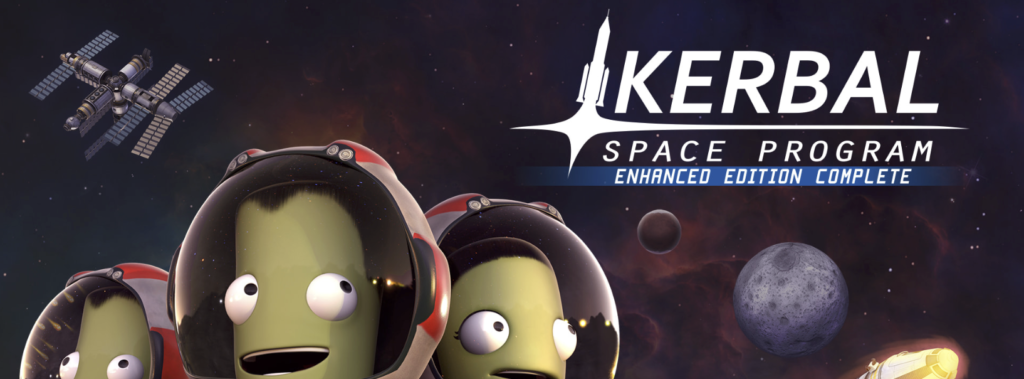Today we Would like to give our thoughts on a rather curious puzzle game called Mosa Lina.
Mosa Lina
At first glance Mosa Lina might look like your usual puzzle platformer. You are dropped into a single screen room. Your goal is to collect or destroy a bunch of fruit, and then make your way towards the exit – and to help out, you are have got some useful mechanics.
Like… a magic spell that makes platforms move, bunch of lumpy tentacles that you can spawn at will. So… drag this apple off screen with a tentacle.

And uh… oh. Can’t get back up.
Okay lemme try that again. Ah well like i said this is not your typical puzzle platformer. Because while the levels are set in stone, the mechanics are actually completely random.
This time we’ve got a butterfly that lets us teleport elsewhere, and then teleport back a few seconds later.

A rectangle where gravity is reversed. And the power to pin platforms.. permanently.

So this game is aggressively random- and that means there are no intended solutions to the puzzles on display. No obvious lock and key connections. Heck: no guarantee that you could actually finish the level with your current load-out.
But the upshot is that you get to be creative and crafty with your solution. You get to find completely unique ways to overcome the level at hand. Maybe shoot an apple out of the sky with a spear, and then use it as a makeshift platform before it plummets off screen. Freeze these spinning spikes in place to make a safe bridge. Jump off a cliff at just the right moment so you’ll teleport back to safety before hurtling to your death. This sort of emergent problem solving really reminds me of immersive sims. That’s genre, or perhaps a design sensibility, that came out of a specific lineage of old PC games like Ultima Underworld and System Shock.
Game Design
They were designed around the idea that you could use powers, tools, magic spell, interlocking systems and enemy Al to come up with totally unique solutions to problems. Resulting in clever stuff like using the wall-mounted mines in Deus Ex as impromptu stepping stones to scale up buildings. And in fact developer Stuffed Wombat actually calls Mosa Lina an immersive sim.
But also sees it as a sort of commentary or response to more modern takes on the genre like Deathloop and Dishonored. In those games, abilities can feel less like emergent problem-solving tools, and more like keys to open specific locks.
You get the super strength ability, and now you can go down the alleyway that’s been blocked by a heavy box. Mosa Lina pushes back against that rigid puzzle-piece mentality, and makes for a game where it’s entirely up to you to find the right solution. And it achieves this in a number of clever ways.
For one tools are just tools. The game is packed with clever, funny inventive and wired little power-ups that manipulate the world in interesting ways. But they’re not tied to any specific object or set-up. You just find uses for them or figure out interesting combinations.
Secondly the game is all about physics. Tentacles wobble pendulums swing tools can make platforms move l, float and drop.
Similar Games
Kerbal Space Program

Games like Kerbal Space Program and Tears of the Kingdom show that the second you add a robust physics to your game, the number of possible actions and options just balloons into infinity. And thirdly, Mosa Lina embraces randomness. If the developer doesn’t know what combination of tools you’ll have, there’s no way to desing a perfect solution. An if the level simply doesn’t work with your current set-up then you can just re-roll and try again with a new collection of mechanics. All of this lead to a game where I found myself creating clever and imaginative strategies over and over again.
Leading to slapstick failures and smart solutions and clutch, last-seconds saves. These are the sort of memorable and emergent stories that you might get one or two times when playing through a typical immersive sim-but hand them every few minutes when playing Mosa Lina this weekend. And it’s also just a really addictive roguelike-style game.
You know that feeling of wanting to play Slay the Spire or Binding of Isaac over and over again because who knows what awesome items and synergies you’ll get this run?
Well same goes for Mosa Lina in each run, the game gives you nine items from a pool of about 20, so you’ll need to play many times to see all of the items, and many, many more times to see how they stack and combine. The developer has already promised to add even more to the pool in future updates.
Off course
I wouldn’t recommend this game to just anyone. You need to be okay with confusion and chaos, and wonky physics and weirdo graphics. There’s no story or structure, so it can feel more like a weird experimental toy than a complete game.
And most importantly: judging by the comments on my videos about games like Tears of the kingdom, there’s definitely a large number of you who don’t want to futz about coming up with own solutions to puzzles.
So if you’re after something more traditional then- bonus recommendation check out Cocoon: a mind-bending puzzle adventure about worlds within worlds within worlds.
It’s an evocative sci-fi game where these coloured orbs aren’t just puzzle solving tools- but actually entire pocket universes that you can jump in and out of at will. It’s also basically the opposite of Mosa Lina.
Cocoon

Cocoon is an explicitly hand-crafted game where every puzzle and solution has gone through months of refinement and iteration to deliver players one, very specific logical conundrum to figure out. No randomness no physics weirdness… no player creativity. But you know what: that’s the great thing about game design. There’s no one perfect way to do anything. There are incredible experiences to be had in games where everything’s been designed by a master craftsperson, taking you on a super specific journey. And incredible experiences to be had in a game that uses randomness, physics and open-ended solutions to make you the master craftsperson. They joy of games is that there’s room for every tybe.
And if you’re a designer like Stuffed Wombat, if you don’t like what’s currently on offer, then make something different and show the world how things could be. Mosa Lina is on Steam for five bucks, with a free demo to check out.
Phantom takes second spot in Apple’s US App Store utilities category